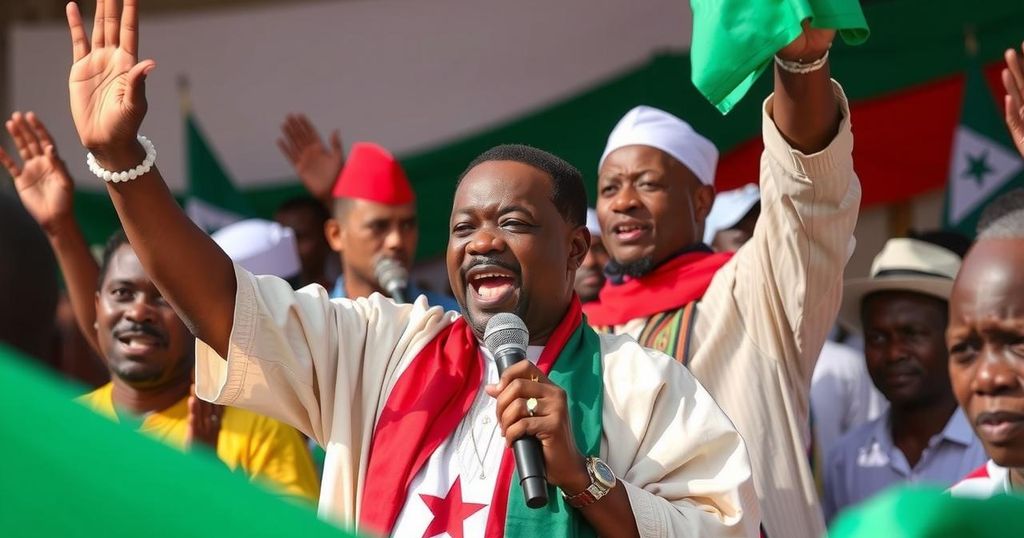World news
2024 ELECTIONS, AFRICA, AHMED BARTCHIRET, AP, ASSOCIATED PRESS, BOKO HARAM, CHAD, DEBY, DJAMENA, ELECTIONS, ELECTORAL PROCESS, GOVERNANCE, GOVERNMENT, LAKE CHAD, MAHA, MAHAMAT IDRISS DEBY, MOUTA ALI ASSOCIATED PRESS, NATIONAL ASSEMBLY, SUCCES MASRA, TRANSFORMERS
David O'Sullivan
0 Comments
Chad’s Ruling Party Secures Parliamentary Majority Amid Opposition Boycott
Chad’s ruling Patriotic Salvation Movement party won 124 of 188 seats in a parliamentary election boycotted by the main opposition, reflecting its consolidation of power. The election, marking Chad’s first in a decade, saw a 51.5% voter turnout. Opponents criticized the election’s credibility, calling it a ‘charade,’ raising concerns about the future of democracy in Chad amidst ongoing security challenges.
In a recent parliamentary election held in Chad, the ruling Patriotic Salvation Movement party has secured a decisive majority, winning 124 out of 188 seats. The election, characterized by a significant boycott from the main opposition parties, saw a voter turnout of 51.5%. This marks the first parliamentary election in over a decade, representing a critical step in Chad’s ongoing transition to democracy following the military takeover in 2021 by Mahamat Idriss Deby, son of the late president Idriss Deby Itno. Deby’s administration has promoted this election as a vital opportunity for decentralization, enabling governance closer to the populace. However, the election faced skepticism as over ten opposition parties, including the prominent Transformers party, labeled it a “charade,” arguing it echoed the circumstances of a disputed presidential vote from the previous year. The election results have not received immediate feedback from the opposition, raising questions about the legitimacy of the political process in Chad, particularly against the backdrop of ongoing security challenges, including threats from Boko Haram.
Chad’s political landscape is notably affected by its historical context, particularly the lengthy rule of Idriss Deby Itno, who maintained his presidency for over 30 years until his death in 2021. Subsequent to Deby’s passing, Mahamat Idriss Deby established a military-led government, promising to steer the nation towards democratic reforms. This parliamentary election is part of what is deemed the final phase of Chad’s transition towards a more representative governmental structure, which seeks to address deep-rooted issues such as decentralization and local governance. Amid these efforts, the boycott by major opposition factions has raised concerns over the credibility and fairness of the electoral process, especially as the nation grapples with external security pressures and shifts in international alliances.
The election, perceived as an integral part of Chad’s transition to democracy, highlighted the prevailing tensions between the ruling establishment and opposition parties. The resistance from more than ten opposition groups reflects a broader discontent regarding the political status quo and the integrity of the electoral process. Mahamat Idriss Deby has advocated for this election as a pathway for local governance reform, suggesting an acknowledgement of the populace’s desire for power distribution. However, skepticism remains prevalent among voters and opposition parties, who fear the election may not effectively foster the democratic ideals touted by the current leadership.
Chad has a tumultuous political history, marked by periods of instability and authoritarian rule. The death of Idriss Deby Itno in 2021 ushered in a transition led by his son, Mahamat Idriss Deby, who initially promised democratic reforms. The current parliamentary election is significant, as it is the first in a decade and is intended to be a stepping stone towards a more democratic governance structure. The opposition’s boycott emphasizes longstanding grievances regarding electoral validity and representation in the political system. The nation’s struggles with security, particularly from militant groups like Boko Haram, further complicate the political landscape, highlighting the delicate balance between governance and national stability.
In conclusion, the recent parliamentary election in Chad underscores significant shifts within its political framework, revealing both the ruling party’s consolidation of power and the persistent opposition’s challenges in engaging with the political process. The result reflects a crucial moment in Chad’s transition to democracy, albeit amidst skepticism about the electoral integrity stemming from a substantial boycott by opposition parties. As Chad navigates its complex security challenges and seeks to implement decentralized governance, the reactions to this election will likely set the tone for future political developments in the country.
Original Source: www.mymotherlode.com




Post Comment